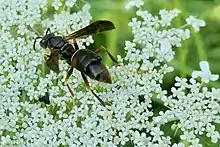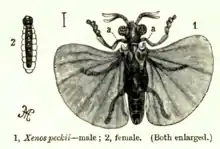Xenos (insect)
Xenos is a genus of insects belonging to the family Xenidae.[1] The word derives from the Greek word for strange.[2] A species of the genus is Xenos vesparum, first described by Pietro Rossi in 1793.[3][4] The females are permanent entomophagous endoparasites of Polistes paper wasps. They dwell their whole lives in the abdomens of wasps.


Four male pupae are visible partially emerged from the wasp's abdomen; likely Xenos peckii, which is a parasite of the paper wasp Polistes fuscatus.
| Xenos | |
|---|---|
 | |
| Scientific classification | |
| Domain: | Eukaryota |
| Kingdom: | Animalia |
| Phylum: | Arthropoda |
| Class: | Insecta |
| Order: | Strepsiptera |
| Suborder: | Stylopidia |
| Family: | Xenidae |
| Genus: | Xenos Rossi, 1793 |
Species
These 33 species belong to the genus Xenos:[1]
- Xenos afer Pasteels, 1950 (Africa)
- Xenos americanus (Brèthes, 1923) (South America)
- Xenos argentinus Brèthes, 1923 (South America)
- Xenos boharti Hofmann, 1965 (South America)
- Xenos bohlsi Hoffmann, 1914 (South America)
- Xenos bonairensis Brèthes, 1923 (South America)
- Xenos circularis Kifune & Maeta, 1985 (Asia)
- Xenos colombiensis Cook, Mayorga-Ch & Sarmiento, 2020
- Xenos dianshuiwengi Yang, 1999
- Xenos formosanus Kifune & Maeta, 1985 (Asia)
- Xenos hamiltoni Kathirithamby & Hughes, 2006 (Central America and Mexico)
- Xenos hebraei Kinzelbach, 1978 (Palearctic)
- Xenos hospitus Oliveira & Kogan, 1962 (South America)
- Xenos hunteri (Pierce, 1909) (North America)
- Xenos indespectus Oliveira & Kogan, 1962 (South America)
- Xenos iviei Kifune, 1983
- Xenos kifunei Cook & Mathison, 1997 (North America)
- Xenos moutoni Buysson, 1903 (Southern Asia and temperate Asia)
- Xenos niger Pasteels, 1950 (Africa)
- Xenos nigrescens Brues, 1903 (North America and South America)
- Xenos oxyodontes Nakase & Kato, 2013 (Southern Asia)
- Xenos pallidus Brues, 1903 (North America)
- Xenos peckii Kirby, 1813
- Xenos peruensis Kifune, 1979 (South America)
- Xenos provesparum Kifune, 1986 (Southern Asia and tropical Asia)
- Xenos ropalidiae (Kinzelbach, 1975)
- Xenos rostratus Trois, 1984 (South America)
- Xenos rubiginosi (Pierce, 1909) (North America)
- Xenos stuckenbergi Pasteels, 1956 (Africa)
- Xenos vesparum Rossi, 1793 (Palearctic and Africa)
- Xenos yamaneorum Kifune & Maeta, 1985 (Asia)
- Xenos yangi Dong, Liu & Li, 2022
- Xenos zavattarii (Pierce, 1911) (Africa)
References
- Benda, D; Pohl, H; Nakase, Y; Beutel, R; et al. (2022). "A generic classification of Xenidae (Strepsiptera) based on the morphology of the female cephalothorax and male cephalotheca with a preliminary checklist of species". ZooKeys (1093): 1–134. doi:10.3897/zookeys.1093.72339. PMC 9010403. PMID 35586542.
- Craig, John (1859). "A new universal etymological technological, and pronouncing dictionary of the English language". Routledge. p. 1090.
- R. Dallai; L. Beani; J. Kathirithamby; P. Lupetti & B. A. Afzelius (2003), "New findings on sperm ultrastructure of Xenos vesparum (Rossi) (Strepsiptera, Insecta)", Tissue and Cell, 35 (1): 19–27, doi:10.1016/S0040-8166(02)00099-X, PMID 12589726
- Fabiola Giusti; Luigi Dallai; Laura Beani; Fabio Manfredini & Romano Dallai (2007), "The midgut ultrastructure of the endoparasite Xenos vesparum (Rossi) (Insecta, Strepsiptera) during post-embryonic development and stable carbon isotopic analyses of the nutrient uptake", Arthropod Structure & Development, 36 (2): 183–197, doi:10.1016/j.asd.2007.01.001, PMID 18089098
This article is issued from Wikipedia. The text is licensed under Creative Commons - Attribution - Sharealike. Additional terms may apply for the media files.